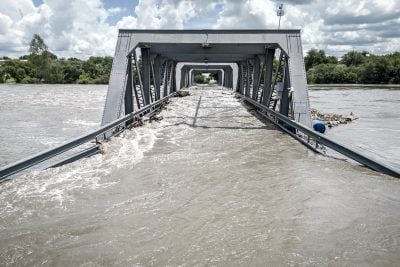The South African government has repealed the controversial national state of disaster that it imposed in February in an effort to deal with the country’s severe electricity supply issues.
On Wednesday,the government said it had terminated with immediate effect the order, imposed on 9 February, which it claimed was “a necessary response to the impact of critical levels of load shedding on the economy and vulnerable sectors such as health and small businesses”.
Load-shedding – the local term for power cuts imposed by the failing state utility Eskom – have been a feature of South African life for years, disrupting businesses and households and decimating economic growth. A raft of further power outages at the beginning of the year prompted the government to reach for more drastic legislative tools.
The government claimed that a national state of disaster would allow it to impose wide-ranging regulations setting out the responsibilities of the different organs of the state to mitigate the impact of severe load shedding, prevent the escalation of supply constraints, and enhance interventions by the National Energy Crisis Committee to achieve its Energy Action Plan, which, among other goals, is tasked with fixing Eskom and improving current supply.
On 6 March, President Cyril Ramaphosa appointed Kgosientsho Ramokgopa to the newly created role of electricity minister to lead the government’s response to the crisis. In recent weeks, the minister has visited Eskom power stations in a bid to solve the problems.
In a press conference, Ramokgopa said that the repeal would not affect his department’s ability to procure sources of power supply: “You don’t need the Disaster Management Act, so I guess the point that is being asked is, the removal of the state of disaster, is it going to undermine the agility, pace and responsiveness of procurement? The answer is an emphatic no.”
The government said that a range of accelerated interventions introduced by departments at the time of the state of disaster declaration will be sustained by existing legislation.
Divisive declaration
Nevertheless, the state of disaster proved divisive and its removal was immediately welcomed. The opposition Democratic Alliance (DA), which opposed its imposition, said in a statement that its repeal is a “victory for South Africans and a reminder that the DA was right in opposing the blanket declaration”.
The DA said that the government should focus on making sure that Eskom’s power plants meet the minimum demands by consumers and called on government to enable a greater role for independent power producers.
“A National State of Disaster under the guise of dealing with the load shedding crisis that the ANC created was only ever going to empower the ANC to abuse procurement processes and issue nonsensical regulations that have nothing to do with the electricity crisis. The reality is that the ANC cannot fix the loadshedding crisis it created.”
In particular, opposition politicians and civil society activists had slammed a decision by the National Treasury to hand Eskom a three-year exemption from reporting on “irregular, fruitless and wasteful expenditure”. Having announced the exemption on 31 March – which the opposition said would be a green-light for corruption at Eskom – minister of finance Enoch Godongwana was forced into a repeal on Wednesday.
“The intention really was to allow the Eskom to have better financial statements, and at the same time create an environment where there remains transparency on corruption, and irregular expenditure, as well as all the other related issues. It was never the intention of the exemption to hide anything in this regard,” Godongwana told a parliamentary committee.
Load shedding expected to continue
Despite the government’s disaster declaration and subsequent repeal, Eskom’s own forecasts show a “code red” situation under which power cuts are likely to continue well into the future. Eskom’s latest weekly system status report shows that forecast demand will exceed available generating capacity for each week of the 52 weeks ahead, resulting in a weekly shortfall of at least 2000 MW.
Anton Eberhard, professor emeritus and senior scholar in the Power Futures Lab at the University of Cape Town’s Graduate School of Business, said in a tweet on Monday that attempts at “quick fixes” had failed.
Want to continue reading? Subscribe today.
You've read all your free articles for this month! Subscribe now to enjoy full access to our content.
Digital Monthly
£8.00 / month
Receive full unlimited access to our articles, opinions, podcasts and more.
Digital Yearly
£70.00 / year
Our best value offer - save £26 and gain access to all of our digital content for an entire year!

 Sign in with Google
Sign in with Google 



